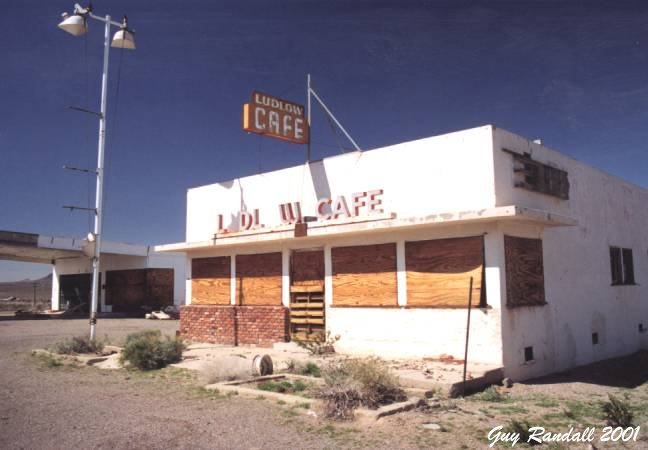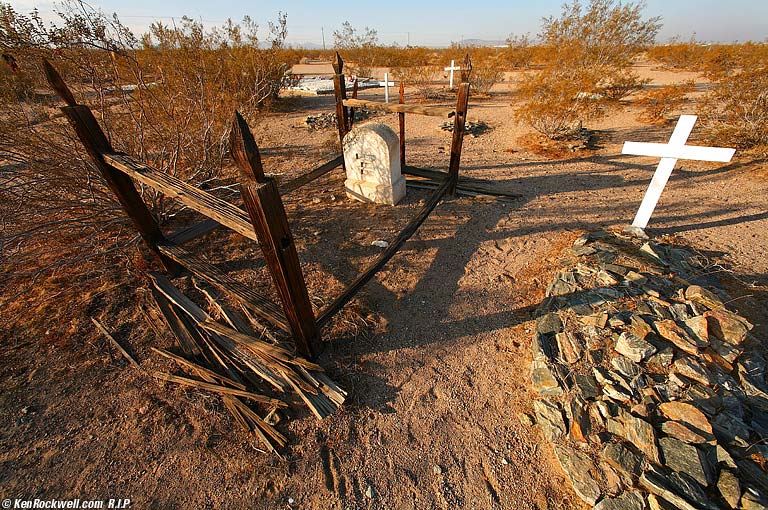They are tiny dots on internet maps and AAA guides, a speck that leads travelers to overlook them and focus on other destinations and big cities. Their names were well known 50, 75 years ago; Oro Grande, Ludlow, Amboy, Bagdad, Daggett, Helendale. Destinations and stops for weary travelers looking for food, water, rest and a break from the miles of empty roadway behind them. As an occasional vehicle or train passes by, some permanent residents have also been passed by, left to vandals, the elements, virtually all but forgotten in Route 66 cemeteries.
The Mother Road's cemeteries lay in a state of disrepair. Located on lonely hillsides, out of sight of the few cars that still travel the legendary road; they are the final resting place for those who came West, searching for a better life. Broken gates, dangling barbwire, and tilted wooden crosses are the first signs of our National Trails Highway cemeteries demise!
For those who found their resting place in roadside towns like Amboy, just outside of town, still within sight of the Roy's sign, lay the remains of several dozen souls. A weather beaten flag pole and slivers of a tattered American flag stand watch over the graves. Rows of hand made wooden crosses mark the graves of the town's former residents and visitors. A few have had stone placed in a circle over them, others are simply mounds of dirt and rock marking the grave.
But Amboy is but one of many, in need of a savior, a community, a government willing to step up and protect their hallowed grounds. The dedication of people like Albert Okura (who owns the Juan Pollo restaurant chain and Amboy) may be able to protect its forgotten graveyard. Amboy is one of the best known stops along The Mother Road and Mr. Okura is fighting an inspiring battle to restore this unique and historical stop back to its former glory.
Travel to Oro Grande and a search will lead you to a quiet hillside, within sight of the towns cement plant. There residents have fought a valiant battle to preserve the cemetery. Vigilant folks have had to endure hoodlums, cultists, the elements and even battled the cement plant to protect the resting place of loved ones. Wooden crosses and stone circles on top of shifting sand, mark the location of Oro Grande's graves, a few vandalized tombstones stand in defiance of the dreadful conditions inflicted on them over the years. Rumors of the cemetery being haunted have drawn the curious, the intoxicated, the bizarre and a few who have intentionally damaged tombstones.
Between Oro Grande and Amboy along Route 66 is Ludlow which continues to cling to existence thanks to its location. But besides stopping for gas, Ludlow does not call travelers to explore it. Abandoned buildings, crumbling adobe and stone walls and an earthquake damaged store stand in testament to a former life. Beyond the buildings, beyond the tracks, lies Ludlow's cemetery. Sagebrush and trees have found their way into the cemetery, often overtaking a grave with roots, trash and debris dangle from its branches. How many lay in rest here, thousands of miles from their home, their family?

Beyond the road, the railroad tracks, revealed only to the diligent searcher, lay Bagdad's cemetery. For those who found their resting place in this out-of-the-way patch of desert, isolation has been both a blessing and a curse. For Bagdad, even remoteness and the Penal Code has done little to prevent grave robbers from attempting to dig up the remains of these forgotten souls. Tattered cloth mix with sage brush, in a 4 foot hole where a grave was desecrated, leaving one to ponder in this inhospitable place, if the victim lay there exposed? A few stones, cans and makeshift crosses are all that cling to a dying effort to mark these graves.
For Route 66 cemeteries, their existence is also a convenient memory loss for those responsible for their care. Both the State Cemetery and Funeral Bureau and the San Bernardino County Board of Supervisors seem oblivious to these resting places. Even though California's Health and Safety Code, place their care, management and supervision under the control of County Government, no time is given, no money is spent to protect and care for Route 66 graveyards.
Poignant questions that are left to the readers, concerned citizens and our elected officials to answer. The dead have no voice, except ours. Who will speak for them?
Ron Paschall
P.O. Box 7076
Redlands, CA 92375
(909) 798-7977


